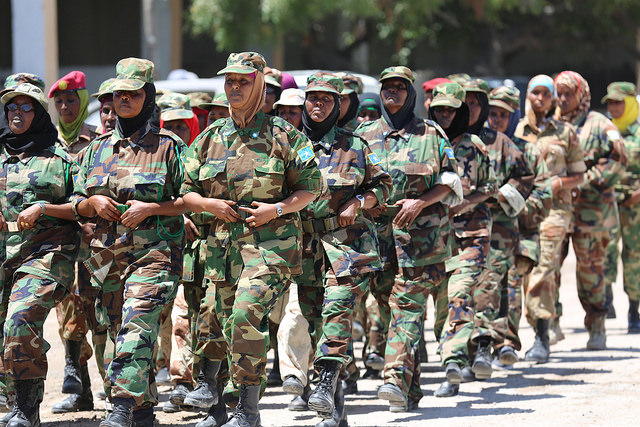SPECIAL REPORT: Civil servants and MPs go without pay for a combined 8 months period


Civil servants and MPs have gone without salaries for a combined period of eight months, an investigation by Goobjoog News reveals.
The military and police too have not been paid for three months while lecturers at the National University who downed their tools this week have had to make do with a plain pay-slip five months.
Civils servants who sought anonymity told Goobjoog News they have not been paid six months salaries accruing from last year and a further two months- August and September this year. “We did not receive salaries for six months last year. This year, we have not been paid for the months of September and August. The government owes me around $10,000 and I hope the Prime Minister will keep his word,” a civil servant said.
CLEAR ALL ARREARS
Prime Minister Hassan Khaire announced Saturday his government would clear all outstanding debts owed to government employees and the disciplined forces by end year. “I want to categorically inform the Somali people wherever they maybe, on 31st December, 2017, any one working for the Somali government whether they are in the military or a civil servant will receive their salaries and the government will pay all its domestic debts from January to December,” the PM said.
A member of parliament who also did not want to be named said they had not received salaries for six months in the 9th parliament which ended early this year. “We have six months arrears from the last parliament and two months for this one,’ the lawmaker said noting he remains optimistic the government will clear the debt.
The government has been struggling to clear domestic debts which the IMF said last month had increased numerous times over what it termed as budgetary allocations based on unrealistic revenue expectations or grants.
The lender which echoed a similar observation by the World Bank in its Second Economic Update for Somalia August called on Somalia to spend within its means.
NATIONAL BUDGET
Parliament endorsed a $267, 577, 964 budget for the fiscal period 2017 in May. Out of this, the government estimated domestic revenue stands at $164,705,501 while total external grants totaled $102,872,464. According to the Accountant General’s June 2017 report, domestic revenue was $10,238,930 against external grant of $4,710,582. Government expenditure in the same period was $18,233,439 with a majority of these, $11,848,185 going to salaries. All expenditure calculated for the month of June occasioned a negative $3.3 million financing gap.
Salaries to 47 government departments with the support of the World Bank totaled $2.9 million, the Accountant General’s July 16, 2017 report reads.
According the 2017 Appropriations Act, the Federal Government has total of 5,526 employees with the majority at grade A (2502) followed by grade B (1527) while grade C is the least with 995 employees. This means the bulk of salaries go to the grade A group whose monthly pay start from $700.
The government will need an average of $6.6 million to offset salary arrears for the 275 MPs over the eight month period. A member of parliament takes home $3,000 per month.
UNREALISTIC TARGET
Bashir Abdi an economist says the Prime Minister’s pledge is unrealistic noting the meagre resources at the government’s exposure cannot allow it to spend it all clearing debts.
“The current government can afford to clear salaries for the remaining two months but cannot clear all the balances for the whole year. For example, government workers are estimated to be around 10,000. If you enquire from them, they will tell you that they have not received salaries for at least 5 or 6 months. Grade A employees with a degree gets $700 per month and in six months that adds to $4,200. That’s quite a huge expense for the government,” said Abdi.
WORLD BANK SUPPORT
The Ministry of Finance June 2016 report on the Recurrent Costs and Reform Financing (RCRF), a World Bank supported project aimed at supporting operational payroll and payment system for the non-security sectors estimates overall civil servants payroll expenses since the inception of the project in 2015 at $47,219,417. The project has since paid $25,776,145 translating to 54.58% of salaries cost in 2015-2017, the report says.
Goobjoog News has also established employees hired by the current administration have gone without salaries some since they started early in the year. New civil servants in various government ministries told Goobjoog News they were yet to receive any salaries. “We understand our salaries were not factored in the current national budget so we haven’t had any salaries. We have been told however we will get all our salaries by January [2018].”